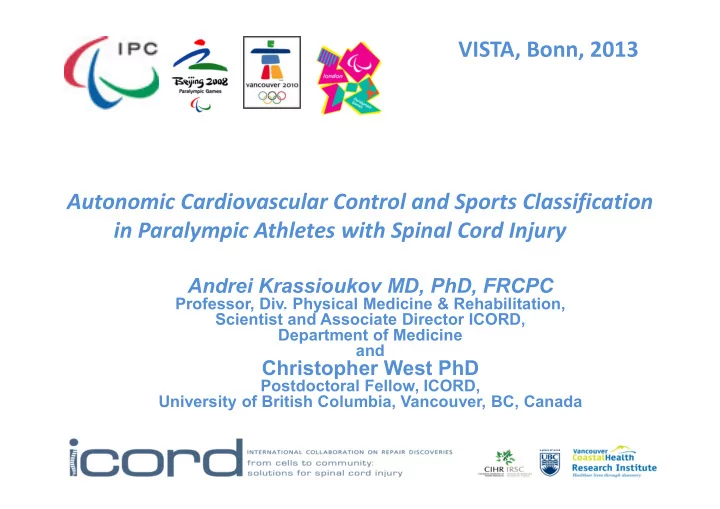

VISTA, Bonn, 2013 Autonomic Cardiovascular Control and Sports Classification in Paralympic Athletes with Spinal Cord Injury Andrei Krassioukov MD, PhD, FRCPC Professor, Div. Physical Medicine & Rehabilitation, Scientist and Associate Director ICORD, Department of Medicine and Christopher West PhD Postdoctoral Fellow, ICORD, University of British Columbia, Vancouver, BC, Canada
Wheelchair Rugby Classification • Wheelchair Rugby is a sport for tetraplegic male and female athletes. Players are classed into one of seven classes: 0.5, 1.0, 1.5, 2.0, 2.5, 3.0 and 3.5, depending on their functional ability. The higher classes are assigned to those players that have higher functional levels and the lower class players are players with less function. • There are three off the court components used to determine players' classification: • Bench Test - a muscle test is performed on all upper extremity musculature, in addition to an examination of range of motion, tone and sensation. • Functional Trunk Test - assessment of the trunk and lower extremities in all planes and situations, this may include a manual muscle test of the trunk muscles. • Functional Movement Tests - pushing, turning, stopping, starting, holding your chair against resistance, dribbling, passing, rimming and transferring are some of the functional skills that may be evaluated. • A player will also be evaluated on the court, while playing; to help determine which class he/she falls into. • During the game, the total value of all the players on the court for a team cannot exceed eight points. This ensures that teams must field a mix of athletes of all functional levels.
Objectives • To present a concept of clinical/neurological classification of spinal cord injury (SCI) • To introduce concept of clinical AUTONOMIC classification of SCI individuals • To describe association with cardiovascular control and Paralympics sport classification. • To outlined future plans
Fight and flight response
ASIA Impairment Scale. What is missing? From Frankel scale (1969) to International Standards for Neurological Classification of Spinal Cord Injury ( ISNCSCI ) – ASIA Impartment Scale Clinical evaluation of the severity Clinical evaluation of the severity Clinical evaluation of the severity Clinical evaluation of the severity 1 st edition 1982 2 nd edition 1987 of SCI of SCI of SCI of SCI 3 rd edition 1889-90 Autonomic 4 th edition 1992 nervous system 5 th edition 1996 assessment? 6 th edition 2000 7 th edition 2011
Tetraplegia Sympathetic NS Parasympathetic NS (Vagus n) Neurogenic shock Abnormal HR responses Low resting blood pressure Orthostatic hypotension Autonomic dysreflexia Loss of sweat response below of SCI Chest and blood vessels of the upper extremity Paraplegia T6 Gut and blood vessels of the lower extremity Orthostatic hypotension Autonomic dysreflexia Loss of sweat response below of SCI
Motor-Sensory completeness SCI versus Autonomic completeness SCI
2009. Introduction of the International Autonomic Standards Page 1 Page 2 International Standards on documentation of remaining Autonomic Function after SCI (ISAFSCI) 1 st edition 2009 2 nd edition 2012
A. Supine B. Seated *
2012 Autonomic Cardiovascular Hea Clinic(ICORD /UBC) LONDON 2012 14 countries 64 athletes with SCI Algeria Australia Austria Brazil Britain Canada Chile Columbia Italy Jamaica South Africa Sweden Turkey USA
Take home message: • We need further research and validation of our present data with respect to a possible addition of autonomic testing to the current functional Paralympic sport classification. • We believe that only a few sports could benefit from this addition. • We hope to continue working closely with the IPC on our mandate to educate Paralympic athletes about cardiovascular health after SCI, including the possible harmful effects of boosting and autonomic dysreflexia.
Acknowledgements: Paralympics clinic was supported Ms. Katie Oster Mr. Edward Milligan Mr. David Hawksworth Mr. John Haythorne Mr. David Doig Dr. Stacy L. Elliott Ms. Cheryl A. Niamath Mr. David Carlin Dr. Debra Van Aggelen Panorama Village Medical Clinic Mr. & Ms. Aleksander and Irina Getman Drs. Rajiv and Stasy Reebye Dr . S. Strovski Dr. Olga Von Lipinski Dr. Thomas W. Oxland Dr. Lowell T. McPhail Dr. Andrei Krassioukov 12
Recommend
More recommend